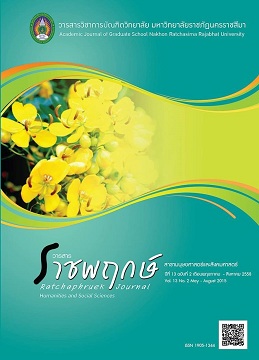ผลของความไม่สอดคล้องระหว่างการกำหนดขนาดตัวอย่าง วิธีการสุ่มตัวอย่าง และรูปแบบการวิเคราะห์เชิงสถิติ ที่มีต่อความถูกต้องและความแม่นยำของค่าประมาณ พารามิเตอร์: กรณีศึกษา ความไม่แปรเปลี่ยนของโมเดลการวัด
Main Article Content
Abstract
การวิจัยครั้งนี้มีวัตถุประสงค์เพื่อศึกษาผลของความไม่สอดคล้องระหว่างการกำหนดขนาดตัวอย่าง วิธีการสุ่มตัวอย่าง และรูปแบบการวิเคราะห์เชิงสถิติ ที่มีต่อความถูกต้องและความแม่นยำของค่าประมาณพารามิเตอร์ของ โมเดลองค์ประกอบเชิงยืนยันลำดับแรก (First-order Confirmatory Factor Analysis)และโมเดลความไม่แปรเปลี่ยน (Invariant model) ข้อมูลเป็นคะแนนผลการสอบของนักเรียนชั้นประถมศึกษาปีที่ 6 ปีการศึกษา 2554 และ 2555 ผลการเปรียบเทียบค่าประมาณพารามิเตอร์ที่ได้จากเงื่อนไขการกำหนดขนาดตัวอย่าง วิธีการสุ่มตัวอย่าง และวิธีการวิเคราะห์ทางสถิติที่สอดคล้องกันและที่ไม่สอดคล้องกันโดยการแยกวิเคราะห์ตามปีการศึกษา 2554 ปีการศึกษา 2555 และโมเดลความไม่แปรเปลี่ยนของพารามิเตอร์พบว่า ค่าพารามิเตอร์ที่ได้จากเงื่อนไขกระบวนการสุ่มตัวอย่างที่สอดคล้องกันมีความเอนเอียงของค่า ประมาณพารามิเตอร์ ค่าร้อยละความเอนเอียงสัมพัทธ์และค่าร้อยละความเอนเอียงสัมพัทธ์ของความคลาดเคลื่อนมาตรฐาน ต่ำกว่าค่าพารามิเตอร์ที่ได้จากเงื่อนไขของทั้งสามลักษณะที่ไม่สอดคล้องกัน และเมื่อพิจารณาในแต่ละเงื่อนไข พบว่า วิธีการสุ่มอย่างง่ายวิธีการสุ่มแบบแบ่งชั้นเมื่อวิเคราะห์บนพื้นฐานของการสุ่มแบบซับซ้อน และการสุ่มแบบแบ่งชั้น วิเคราะห์บนพื้นฐานของการสุ่มอย่างง่าย มีความถูกต้องและแม่นยำในการประมาณค่าพารามิเตอร์มากกว่าการสุ่มแบบแบ่งกลุ่ม เมื่อวิเคราะห์บนพื้นฐานของการสุ่มแบบซับซ้อนและการสุ่มอย่างง่าย
The Effect of Incongruence among Sample Size Determination, Sampling Methods and Statistical Analysis on Accuracy and Precision of Parameter Estimation: A Case Study of an Invariance Measurement Model
The objectives of this research were to examine and compare the effect of Incongruence among Sample size determination, sampling methods and statistical analysis on accuracy and precision of parameter estimation. The model for this study is the First-Order Confirmatory Factor Analysisand the information used for pseudois the score of 37,386 the sixth graders. The research findings revealed thatwhen compare to parameter estimate based on the condition of sample size determination, sampling methods and statistical analysis, they found that the parameter estimate of congruent methods, relative parameter estimation bias and the relative standard error biasare lower than estimate parameter of incongruent methods. When each condition was compared,it found that simple random sampling, stratified random sampling based on the complex data analysisand stratified random samplinghave more accuracy and precision than cluster random sampling analyzed on complex data analysis and cluster random sampling analyzed on simple random.


